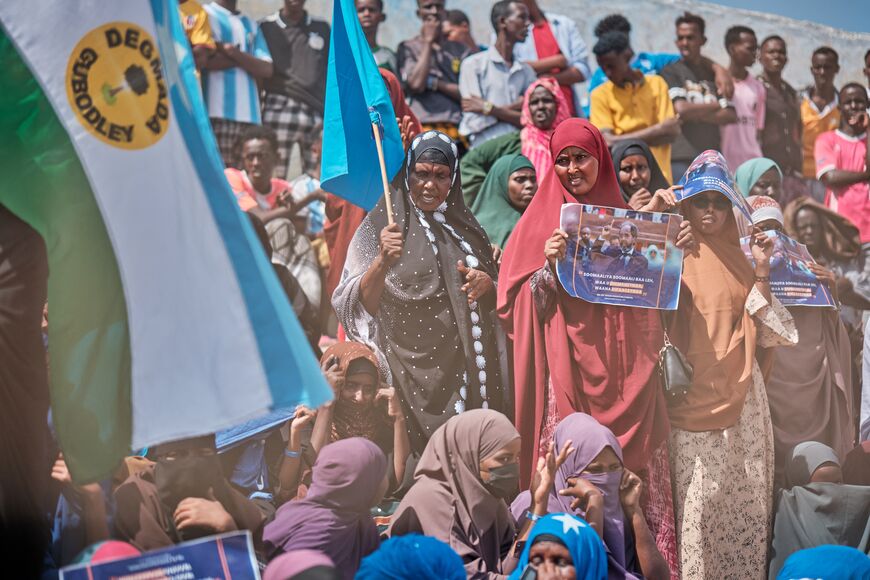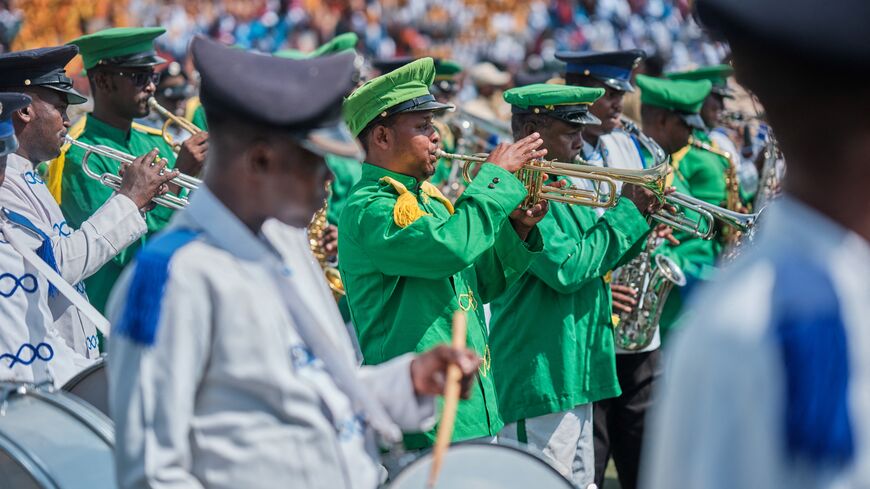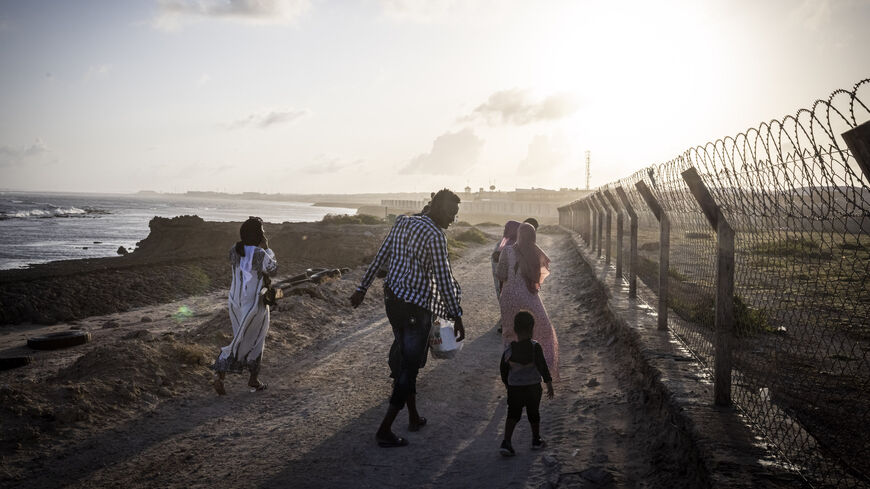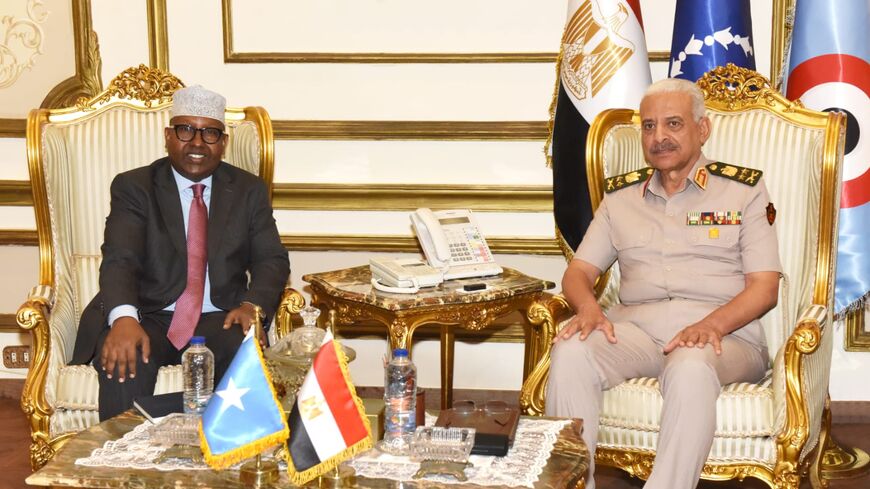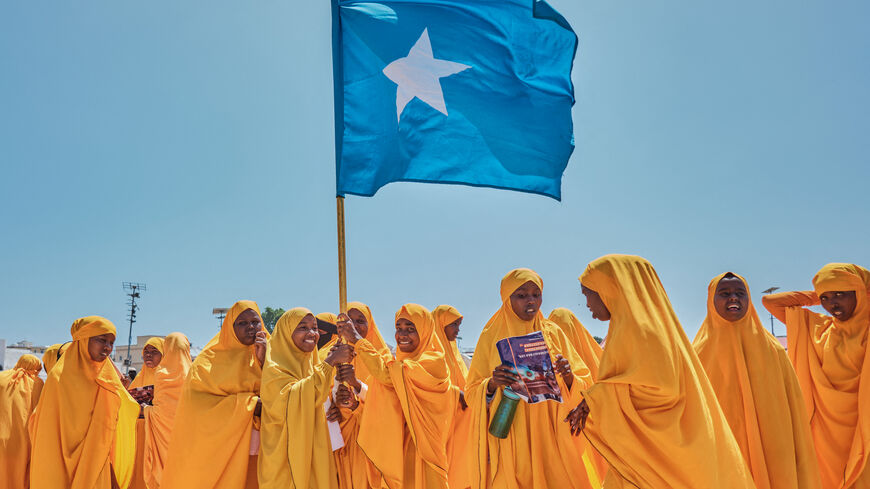Alarmed over Ethiopia-Somaliland deal, Arab FMs rally behind Somalia, Egypt
Somalia denied entry to an Ethiopian flight heading to Somaliland, as a controversial deal signed between the latter and Ethiopia continues to be a source of concern in the region.

The Arab League held an emergency virtual meeting of foreign ministers on Wednesday to discuss a controversial deal struck between Ethiopia and the breakaway region of Somaliland earlier this month.
The meeting was convened at the request of Somalia, which vehemently rejected the Jan. 1 deal as a violation of its sovereignty.
The deal would give landlocked Ethiopia access to the Red Sea via the port of Berbera in Somaliland, and in exchange, Addis Ababa would recognize the breakaway region as an independent state.
Somaliland, a 177,000-square-kilometer territory on the coast of the Gulf of Aden with a population of around 5.7 million, declared its independence from Somalia in 1991. However, it remains recognized internationally as part of the East African country.
Speaking at the opening of Wednesday’s virtual meeting, Arab League Secretary-General Ahmed Aboul Gheit stressed the pan-Arab organization’s support for Somalia and its territorial sovereignty.
He further expressed the Arab League’s position against the Ethiopia-Somaliland deal, describing it as a “blatant violation” of international laws.
Aboul Gheit also accused some parties — which he did not name — of trying to impose a new geopolitical reality in the Horn of Africa in light of the current developments in the Middle East, including the war in the Gaza Strip. He called on the international community to stand by Somalia’s federal government and prevent any action that could destabilize the already fragile situation inside Somalia.
For his part, Somalia’s Ambassador to the Arab League Elias Sheikh Omar Abu Bakr reiterated his country’s condemnation of the deal.
“This unilateral move by Ethiopia poses a threat to Arab national security and Red Sea shipping,” he said during the meeting. “It’s an attempt to undermine the sovereignty and independence of the Federal Republic of Somalia.”
Egypt, which is in a yearslong dispute with Ethiopia over the Nile waters, also chimed in during the meeting, warning against Addis Ababa’s “unilateral policies that violate the rules of international law and the principles of good neighborliness.”
In his speech before the Arab officials, Foreign Minister Sameh Shoukry accused Ethiopia of being a “source of instability” in the region.
Ties between Egypt and Ethiopia have been fraught with tensions since Addis Ababa began constructing in 2011 a mega-dam on the Blue Nile, the main tributary of the Nile River. While Ethiopia argues that the dam is necessary for its economic development, Egypt has warned of the dam's impact on its own share of Nile waters.
Since then, Egypt has sought to revive its role in the African continent and build ties with Ethiopia’s neighboring countries, including Somalia, to mobilize support for its position on the Grand Ethiopian Renaissance Dam.
During the Arab League meeting, Shoukry further stressed Egypt’s unwavering support for Somalia and its territorial integrity. “Coordination is ongoing [between Egypt and Somalia] to provide the Somali side with the necessary training and support for its cadres to achieve its full sovereignty on the entirety of its lands,” he added.
Somali President Hassan Sheikh Mohamud is expected to visit Egypt soon upon an invitation by his Egyptian counterpart, Abdel Fattah al-Sisi.
Concerns of more trouble in the region
The agreement, signed between Ethiopian Prime Minister Abiy Ahmed and Somaliland leader Muse Bihi Abdi, was met with widespread condemnation from several countries in the region.
The Ethiopian government has defended its decision to sign the deal, saying “no party or country will be affected.”
On Wednesday, the Somali government denied entry to a flight reportedly carrying Ethiopian officials to Somaliland.
The Somali Civil Aviation Authority said in a statement that Ethiopian Airlines flight ET8372 en route to the Somaliland capital of Hargeisa was turned back “due to the absence of the necessary permissions.”
Today, on 17/01/2024, the @Som_CAA denied entry to an Ethiopian Airlines plane, type Dash 8-Q400, bearing the flight number ET8372 en route to Hargeisa. The aircraft was turned back before entering Somalia's airspace due to the absence of the necessary permissions. pic.twitter.com/elCgoEMjFr
— Somali Civil Aviation Authority (SCAA) (@Som_CAA) January 17, 2024
Meanwhile, the United States warned in early January of the deal’s repercussions within the region, calling for dialogue between the disputing parties to resolve the issue.
White House National Security Council spokesman John Kirby said Wednesday the deal poses national security concerns.
“We're certainly troubled,” Kirby told VOA News on Wednesday. “As we've said many, many times, we support Somalia's sovereignty, their territorial integrity, and it's got to be respected.”
“What we're particularly concerned about is this [deal] inked recently between Ethiopia and Somaliland threatens to disrupt the fight that Somalis, Africans and regional international partners, including us, are waging against (militant group) Al-Shabaab,” he further warned.
Several parties have raised concerns that the deal would disturb the already volatile Horn of Africa.
Over the past decade, Somalia has faced an insurgency led by Al-Shabaab militant group against the fragile central government. The Sunni extremist group has claimed responsibility for several deadly attacks in recent years, including one at an African Union military base in Somalia’s Bulo Marer town that killed more than 137 soldiers.
On Tuesday, three people were killed and two others injured when a suicide attacker blew himself up near a busy cafe in the Somali capital, Mogadishu. Al-Shabaab claimed responsibility for the attack.
Sudan, for its part, is grappling with a devastating civil war that has killed more than 12,000 people since April 2023.
In the Red Sea, Yemen’s Houthi rebels have launched a string of missile and drone attacks against commercial vessels linked to Israel over the latter’s war on the Gaza Strip. The United States has retaliated by launching strikes against Houthi military positions inside Yemen.
Uganda is hosting an extraordinary meeting of the Intergovernmental Authority on Development (IGAD) on Thursday to discuss ways to de-escalate tensions between Ethiopia and Somalia over the recent deal.
IGAD is a trade bloc in Africa that includes Sudan, Kenya, Ethiopia, Uganda, Somalia and Djibouti.
However, Ethiopia said it would not attend the meeting. In a letter addressed to the IGAD secretariat, the Ethiopian Foreign Ministry cited “a prior engagement that overlaps with the scheduled meeting.”



